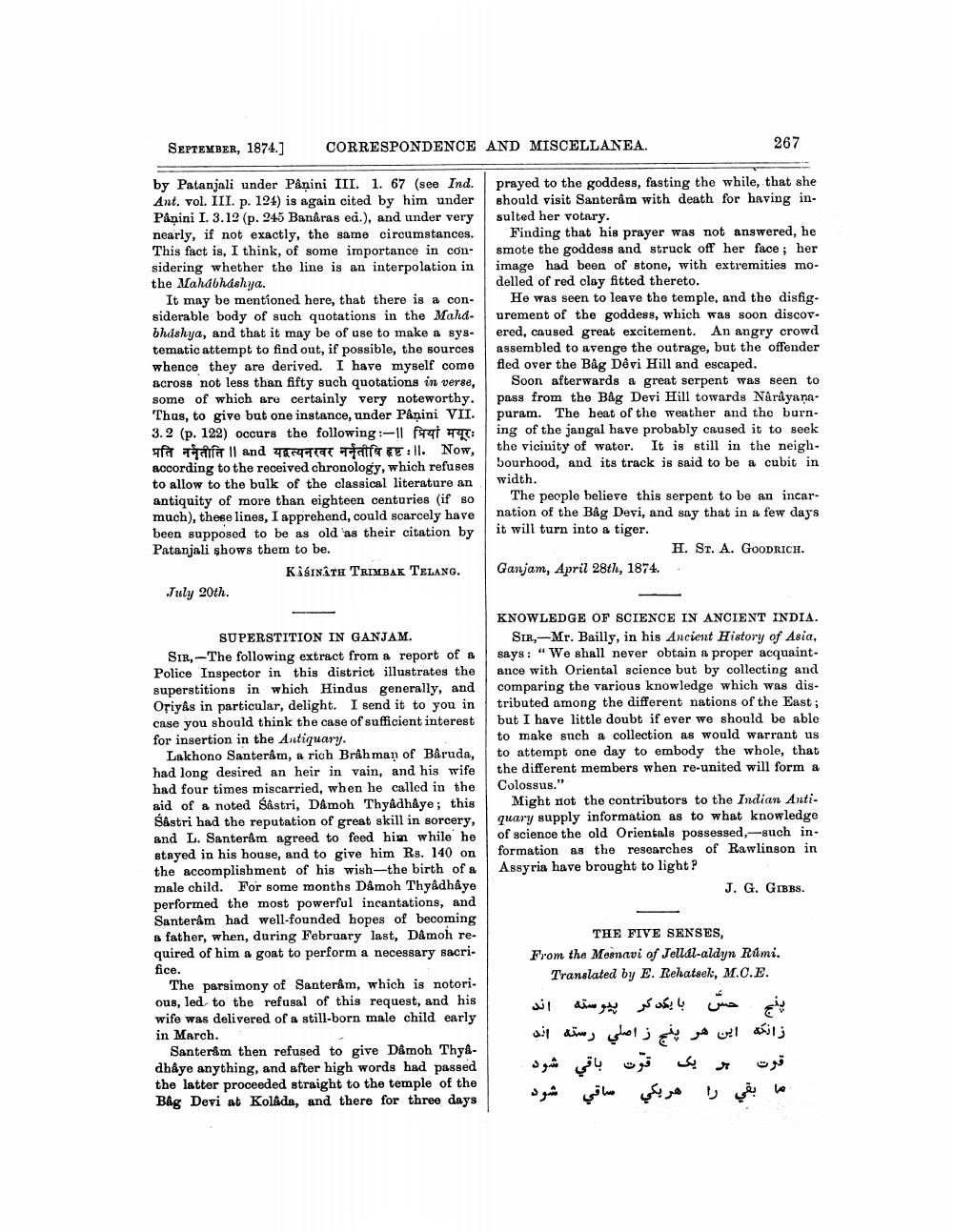________________
CORRESPONDENCE AND MISCELLANEA.
SEPTEMBER, 1874.]
by Patanjali under Pânini III. 1. 67 (see Ind. Ant. vol. III. p. 124) is again cited by him under Panini I. 3.12 (p. 245 Banâras ed.), and under very nearly, if not exactly, the same circumstances. This fact is, I think, of some importance in considering whether the line is an interpolation in the Mahabháshya.
It may be mentioned here, that there is a considerable body of such quotations in the Mahdbhashya, and that it may be of use to make a systematic attempt to find out, if possible, the sources whence they are derived. I have myself come across not less than fifty such quotations in verse, some of which are certainly very noteworthy. Thus, to give but one instance, under Pânini VII. 3.2 (p. 122) occurs the following:-11 fri : प्रति नर्नुतीति ॥ and यद्वत्यनरवर नर्नुतीषि हृष्ट: ॥. Now, according to the received chronology, which refuses to allow to the bulk of the classical literature an antiquity of more than eighteen centuries (if so much), these lines, I apprehend, could scarcely have been supposed to be as old as their citation by Patanjali shows them to be.
KASINATH TRIMBAK TELANG.
July 20th.
SUPERSTITION IN GANJAM.
SIR,-The following extract from a report of a Police Inspector in this district illustrates the superstitions in which Hindus generally, and Oriyâs in particular, delight. I send it to you in case you should think the case of sufficient interest for insertion in the Antiquary.
Lakhono Santerâm, a rich Brâhman of Bâruda, had long desired an heir in vain, and his wife had four times miscarried, when he called in the aid of a noted Sâstri, Damoh Thyâdhâye; this Sastri had the reputation of great skill in sorcery, and L. Santerâm agreed to feed him while he stayed in his house, and to give him Rs. 140 on the accomplishment of his wish-the birth of a male child. For some months Dâmoh Thyâdhâye performed the most powerful incantations, and Santerâm had well-founded hopes of becoming a father, when, during February last, Dâmoh required of him a goat to perform a necessary sacrifice.
The parsimony of Santerâm, which is notorious, led to the refusal of this request, and his wife was delivered of a still-born male child early in March.
Santeram then refused to give Damoh Thyâdhâye anything, and after high words had passed the latter proceeded straight to the temple of the Bag Devi at Kolâda, and there for three days
prayed to the goddess, fasting the while, that she should visit Santerâm with death for having insulted her votary.
267
Finding that his prayer was not answered, he smote the goddess and struck off her face; her image had been of stone, with extremities modelled of red clay fitted thereto.
He was seen to leave the temple, and the disfigurement of the goddess, which was soon discovered, caused great excitement. An angry crowd assembled to avenge the outrage, but the offender fled over the Bâg Dêvi Hill and escaped.
Soon afterwards a great serpent was seen to pass from the Bag Devi Hill towards Narayanapuram. The heat of the weather and the burning of the jangal have probably caused it to seek the vicinity of water. It is still in the neighbourhood, and its track is said to be a cubit in width.
The people believe this serpent to be an incarnation of the Båg Devi, and say that in a few days it will turn into a tiger.
H. ST. A. GOODRICH.
Ganjam, April 28th, 1874.
KNOWLEDGE OF SCIENCE IN ANCIENT INDIA. SIR, Mr. Bailly, in his Ancient History of Asia, says: "We shall never obtain a proper acquaintance with Oriental science but by collecting and comparing the various knowledge which was distributed among the different nations of the East; but I have little doubt if ever we should be able to make such a collection as would warrant us to attempt one day to embody the whole, that the different members when re-united will form a Colossus."
Might not the contributors to the Indian Antiquary supply information as to what knowledge of science the old Orientals possessed,-such information as the researches of Rawlinson in Assyria have brought to light?
3
J. G. GIBBS.
THE FIVE SENSES,
From the Mesnavi of Jellál-aldyn Rúmi. Translated by E. Rehatsek, M.C.E.
اند پنی حس با یکه گر پیوسته زانکه این هر پنج ز اصلي رسته اند قون باقي شود یک قوت
قوت
ما بقي را هر يكي ساقي شود
26




